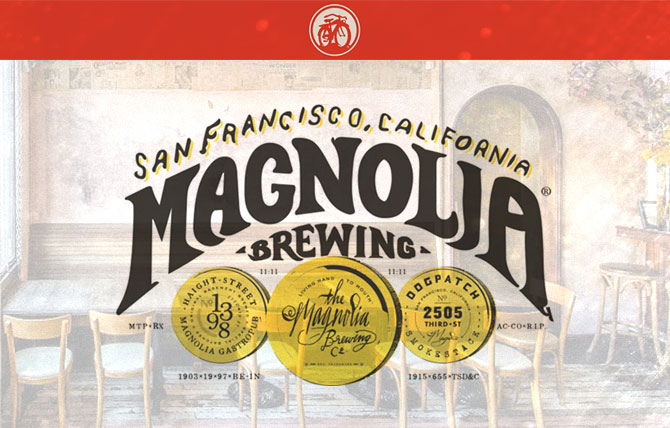
Dick Cantwell has spent the past few days making beer at his new brewing venture — San Francisco’s 20-year-old Magnolia Brewing Company.
“I haven’t been doing a lot of that in the last couple of years,” Cantwell told Brewbound earlier this week.
Cantwell, along with New Belgium Brewing Company and Belgium’s Oud Beersel, last week agreed to purchase Magnolia for $2.7 million, ending a nearly two-year-long bankruptcy process that included meetings with seven interested buyers. In doing so, Cantwell, who co-founded Seattle’s iconic Elysian Brewing in 1995, which would be sold to Anheuser-Busch InBev 20 years later, made his official return to the brewing industry.
Cantwell, who voted against the sale to A-B InBev, resigned from the company three months after the deal was announced. At the time, Cantwell agreed to a non-compete that restricted him from working with breweries in 47 U.S. states for a period of one year and he is still not allowed to work with breweries in Washington, Oregon and Idaho until 2020.
Now, Cantwell finds himself on the other side of the acquisition process, this time purchasing a craft brewery in a deal he believes stands in stark contrast to ones made by multinational conglomerates such as A-B InBev, which owns 10 U.S. craft breweries, or Heineken, which owns Lagunitas Brewing Company.
“It’s been super gratifying to be part of something that people feel good about,” he said.
Cantwell told Brewbound that the group wasn’t aware of Magnolia’s bankruptcy proceedings until shortly before this year’s Craft Brewers Conference, held in Washington D.C. in April. During the event, he and Jordan approached Magnolia founder Dave McLean to get a better understanding of brewery’s situation.
His journey back to brewing began shortly after his resignation, however, when he joined a New Belgium Brewing-sponsored trip to Belgium — Cantwell is dating Kim Jordan, the co-founder of Colorado-headquartered brewery — and stopped at the Oud Beersel blendery. During the visit, he found himself joking about being unemployed with the blendery’s owner, Gert Christiaens.
Christiaens’ reply: “Maybe we should do a lambic brewery in the States.”
“I was like, ‘Oooh, there’s an idea,’” Cantwell said.
The idea eventually moved from concept to reality when Cantwell and Christiaens began writing a business plan for a stateside blendery located in the Bay Area, where Cantwell and Jordan live part time.
“I almost semi-secretly hoped for New Belgium’s involvement in this project, but I certainly didn’t assume it,” Cantwell said, stressing that the venture needed to make strategic sense for New Belgium.
In an attempt to convince New Belgium to co-invest, Cantwell and Christiaens assembled a formal pitch that highlighted the advantages of coming along as a majority partner. For the fourth-largest domestic craft brewery, that meant tapping into Magnolia’s enhanced ability to move nimbly on brewing and experimenting with new styles, and access to another retail location.
“I think it’s good for New Belgium to have this different way of expressing themselves,” Cantwell said.

Cantwell said he was initially attracted to the Magnolia business because of its two brewery and taproom locations. The company operates a 30-barrel brewing system at its “Smokestack” in the Dogpatch neighborhood of San Francisco, and a 7-barrel system at its original Haight-Ashbury brewpub. The possibility of sharing beer between the facilities reminded Cantwell of his days at Elysian, which has five locations throughout Seattle.
“That’s what I really look forward to being able to do and what Magnolia has already done,” he said, noting the ability to transfer liquid between locations and scale up small batches.
Cantwell will oversee brewing operations at Magnolia, but he won’t be putting on his brewers boots on a daily basis. Instead, he plans to focus on creating and introducing new beers to customers who visit Magnolia’s two taprooms.
“I will be around a lot,” he said. “Kim’s and my intention is to be in San Francisco more than half the time.”

As for Magnolia founder Dave McLean, his new role has yet to be fully redefined, Cantwell said, adding that McLean is likely to continue collaborating within the brewhouse and serving as the “primary face of the company.”
“He’s putting together his ideas about what he wants to do,” he said. “For the last year-and-a-half, Dave really hasn’t had the luxury to think about what he wants to do because he’s been forced into position of just keeping the place afloat.”
Cantwell — who has authored books on how to produce certain varieties of beer and how to start a craft brewery — said he’s only just begun reviewing Magnolia’s processes and recipes, which he doesn’t plan to modify in the short-term.
Nevertheless, now that Cantwell has access to 40 draft lines, there’s plenty of room to experiment.
Cantwell also plans to pivot slightly from Magnolia’s focus on creating English-style beers. Despite the company’s commitment to those offerings, its most popular beers have been Proving Ground American-style IPA and Kalifornia Kolsch, which together account for about 75 percent of sales.
“For Dave, it’s a labor of love to do all of these, and I share that taste,” Cantwell said, “but I don’t think we need to pour 20 of them.”
Cantwell said he plans to foster a “cooperative spirit” at Magnolia and encourage brewers to regularly suggest new recipes, a process that will have “endless creative possibilities” once a coolship, wooden-aging vessels and additional fermentation tanks are installed.
“We’ll have all of those things at our fingertips,” he said. “I can’t think of any other entity that has that kind of flexibility.”
